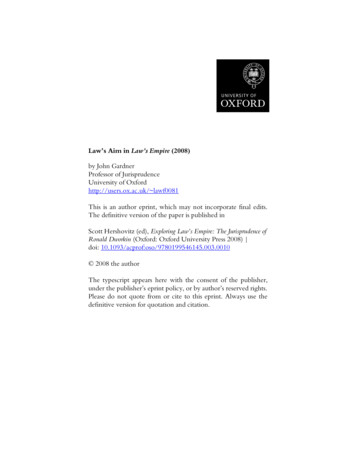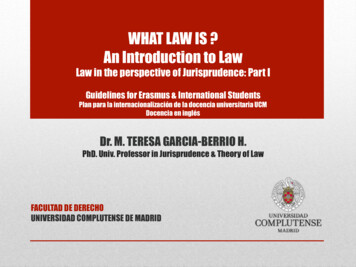
Transcription
Law’s Aim in Law’s Empire (2008)by John GardnerProfessor of JurisprudenceUniversity of Oxfordhttp://users.ox.ac.uk/ lawf0081This is an author eprint, which may not incorporate final edits.The definitive version of the paper is published inScott Hershovitz (ed), Exploring Law’s Empire: The Jurisprudence ofRonald Dworkin (Oxford: Oxford University Press 2008) doi: 10.1093/acprof:oso/9780199546145.003.0010 2008 the authorThe typescript appears here with the consent of the publisher,under the publisher’s eprint policy, or by author’s reserved rights.Please do not quote from or cite to this eprint. Always use the definitive version for quotation andcitation.
Law’s Aim in Law’s EmpireJOHN GARDNER*IDoes law have a purpose or point? Surely it does. The trickierquestions are these: Does law have a unifying purpose or point?Does law have a distinctive purpose or point? Many think that,inasmuch as law has a unifying purpose – such as ‘the guidance ofconduct’ – it is not a distinctive purpose. It is a purpose shared bymany things that are not law. And inasmuch as law has moredistinctive purposes – such as ‘being the final public arbiter ofdisputes’ or ‘monopolizing the use of force’ – they are notunifying. Each such purpose is the purpose of some law but notof all law. H.L.A. Hart’s book The Concept of Law is perhaps thebest-known defence of this conjunction of views.1 Although heaccepts that law has purposes, Hart advances a non-purposive*Professor of Jurisprudence, University of Oxford, and Visiting Professor,Yale Law School. I have included some reworked material from a moreambitious (but unpublished) paper co-written with Elisa Holmes. Thanks toElisa for helping to develop, and then to disentangle, our two projects.Thanks also to Jules Coleman, Scott Hershovitz and Maris Köpcke-Tinturéfor showing the need to disentangle, and for many other helpful suggestions.1H.L.A. Hart, The Concept of Law (Oxford 1961). On some of law’sdistinctive but non-unifying purposes, see 38-41. On some of law’s unifyingbut non-distinctive purposes, see 189-95. See also Hart’s postscript to thesecond edition of The Concept of Law (Oxford 1994), at 248-9. (Subsequentreferences are to the first edition unless otherwise indicated.)
2John Gardner(and indeed non-functional2) account of what legal norms havein common that distinguishes them from other norms.Ronald Dworkin belongs to a long tradition of writers whohold, by contrast, that law has some purpose that is both unifyingand distinctive. His book Law’s Empire is an unusual contributionto this tradition in that it stands for the view that law must have aunifying-and-distinctive purpose, but it does not commit itself toa final view on what this purpose is.3 In chapter 3 of Law’sEmpire, Dworkin provisionally attributes a purpose to law inorder to ‘organize[ ] further argument about law’s character’.4Even if he has this purpose wrong, he argues, some unifying-anddistinctive purpose for law must be relied upon if argumentsabout the nature of law are to get off the ground. We need ‘astatement of the central concept of [our] institution that willallow [us] to see our arguments as arguments over rivalconceptions of that concept.’5 To furnish such a ‘conceptualstatement’6 in the case of law, he says, we must find ‘the mostabstract and fundamental point of legal practice’.7 For law is an‘interpretive enterprise’8 and this means that those who areinterested in finding out what (else) is true about law have tobegin by taking an ‘interpretive attitude’ to their subject. This inturn means starting from the assumption that law ‘has some2For Hart, as for Kelsen, neither their intended nor their actual effects setlegal systems apart from other normative systems. As Green aptly summarizesthe Hart-Kelsen view, law is ‘a modal kind and not a functional kind.’ LeslieGreen, ‘The Concept of Law Revisited’ Michigan Law Review 94 (1996), 16873R.M. Dworkin, Law’s Empire (Cambridge, Mass. 1986). Hereafter ‘LE’.4LE, 93.5LE, 92.6LE, 92.7LE, 93. For present purposes I assume that nothing turns, for Dworkin, onthe distinction between ‘law’ and ‘legal practice’.8LE, 90.
Law’s Aim in Law’s Empire3point’ that sets it apart and brings it together it as the particularinterpretive enterprise that it is.9Here Dworkin’s argument proceeds transcendentally. Unlikemany before him, he does not try to show that law must have aunifying-and-distinctive purpose by showing what unifying-anddistinctive purpose law has. Rather, he tries to show that lawmust have a unifying-and-distinctive purpose by showing thatwe cannot make sense of law without assuming one. Thequestion of which unifying-and-distinctive purpose law has canbe settled later. Meanwhile we can make do with a provisionalproposal that is pencilled in for the sake of argument.So what purpose does Dworkin provisionally attribute to lawfor the sake of argument? The following purpose, he says, is‘sufficiently abstract and uncontroversial’ to do the job:Our discussions of law by and large assume, I suggest, that the mostabstract and fundamental point of legal practice is to guide andconstrain the power of government in the following way. Law insiststhat force [ coercion] not be used or withheld except as licensed orrequired by individual rights and responsibilities flowing from pastpolitical decisions about when collective force is justified.10Dworkin’s Suggested Purpose, or DSP as I will call it for short, iscomplex and intriguing. But is it plausible? I think not. At anyrate, it is far from uncontroversial. As many have pointed out, alegal system might still exist, and if it did would still have apurpose or point, in a society of angels. Since the ex hypothesiperfect population of such a society will be guided by the exhypothesi perfect laws and policies of their ex hypothesi perfectgovernment, coercion by that government will not be needed,and will not be used, to get them to fall into line with law. Nor,9LE, 47.10LE, 93. The square-bracketed insertion reflects what Dworkin says a fewlines later, and is added here to reduce the volume of quotation.
4John Gardnertherefore, will law be called upon to regulate governmentcoercion. Yet there will still be co-ordination problems to whichangelic law may provide the best solutions (what side of the roadto drive angelic vehicles on, what frequencies to allocate toangelic cellphones, etc.). So angelic law may still exist and, if itdoes, it will still have a purpose – even though there is nocoercion by angelic governments for it to ‘guide and constrain’.11There are several things one can learn from this exoticthought-experiment. The most important lesson is this: That thelicensing of government coercion in ordinary human legalsystems, even when successful, is a consequence of a deeperfailure. As Hart captures the point, the resort to legal coercion isa ‘pis aller’, a ‘secondary provision[ ] for a breakdown in case theprimary intended peremptory reasons are not accepted as such.’12Whatever other purposes law may have, it clearly has the purposeof providing law-subjects, including the government, withnormative guidance; that is to say, of subjecting their conduct tothe governance of norms. If only law were fully to succeed in thispurpose, if only all law-subjects were to use legal norms as theyare supposed to be used, by being guided by them qua norms,there would be no need, and no case, for the government tocoerce people into conformity with those same norms. So therewould be no need for law to regulate government coercion. Ifthat much is true, then DSP, even if it is a distinctively legalpurpose, is not a unifying one. It is a purpose of law only onthose occasions when law has failed to achieve its more unifying(albeit less distinctive) purpose of providing normative guidancefor use by its subjects.11Aristotle, Nicomachean Ethics 1179b30-1180b28; Hart, The Concept of Law,above note 1, 195; Joseph Raz, Practical Reason and Norms (London 1975),159; John Finnis, Natural Law and Natural Rights (Oxford 1980), 266-7.12Hart, ‘Commands and Authoritative Legal Reasons’ in his Essays onBentham (Oxford 1982), 254.
Law’s Aim in Law’s Empire5IIAlthough I have just made my own sympathies clear, my interesthere is not in developing this critique of DSP.13 I am interested,rather, in an aspect of DSP that the critique, as it stands, leavesunchallenged. Possibly law’s purpose, even in a society of angels,is not merely to provide its subjects (including the government)with normative guidance. Possibly law’s purpose, morespecifically, is to provide its subjects with justified normativeguidance. This view has been defended at length by John Finnisin Natural Law and Natural Rights. To Finnis, the ‘society ofangels’ thought-experiment14 tends to suggest, not that law lacksa unifying-and-distinctive purpose, but that law has a unifyingand-distinctive purpose quite different from DSP. The purpose isthat of providing co-ordination of conduct for the commongood.15 This purpose is in two respects more distinctive than thatof merely providing normative guidance to law-subjects. In thefirst place, according to Finnis, law aims to provide normativeguidance to law-subjects that works in a distinctive way, namelyby co-ordinating their conduct. In the second place, law aims toprovide normative guidance that lives up to a certain standard: itaims to serve the common good. This second specification is theone that we are concerned with here. It entails an importantfeature that Finnis’s suggested purpose shares with Dworkin’s.For Finnis and Dworkin alike, law aims to guide its subjects13One way to attempt a rescue of DSP might be to argue, with Kelsen, thatthere are no legal norms except those that regulate the coercive conduct ofstate officials. In Kelsen’s words: ‘Law is the primary norm which stipulatesthe sanction.’ See General Theory of Law and State (Cambridge, Mass. 1949),63. This view of Kelsen’s has not, however, survived Hart’s critique of it inThe Concept of Law, above note 1, 35-41.14Or ‘world of saints’, as Finnis prefers: Natural Law and Natural Rights, abovenote 11, 269.15Ibid, e.g. at 334-336.
6John Gardnerproperly, soundly, upstandingly, well. Law aims to be justified inthe guidance that it gives to those whom it aims to guide, suchthat what they do, when they are guided by law and make nolegal mistakes, will itself be justified.One should be careful not to trivialize this thesis. In all normgoverned pursuits, questions of justification arise that are, so tospeak, internal to the pursuit. They are simply questions ofwhether the norms are being adhered to. In a game of Monopoly,for example, I land on ‘Chance’ and draw the ‘Go Directly toJail’ card. The ‘banker’ refuses to pay me the ‘salary’ I usually getfor passing ‘Go’. Is this refusal justified? The answer depends onthe rules of Monopoly. Barring exceptional circumstances (e.g. weare playing for the last space in the lifeboat, or the ‘banker’ is acheat), the act of denying me the ‘salary’ has no significanceoutside the game, and there is no relevant extra-ludic standard ofassessment. In law, we are sometimes temporarily interested injustification conceived in this purely internal way. On someoccasions and for some purposes, we merely want to knowwhether what we are doing is justified by the legal system’s ownrules, however quirky and technical. As a landlord of propertiesin Sweden, for example, one may want to know what deadlineSwedish law sets for serving a notice to quit following a breach oflease, because one may want to know what the legalconsequences will be of postponing service of the notice untilrent negotiations are complete. This is a superficially game-likequestion. As a lawyer, one may sometimes be tempted to thinkof it on the model of Monopoly. But law, as Finnis rightlyemphasizes, is not a game.16 Everything done by law affectssomeone, or potentially affects someone, in a morally significantway. Thus a question of legal justification always invites, andnever eclipses, a further question of justification. Swedish law sets,let us suppose, a 14-day deadline for serving a notice to quit16Ibid, 305.
Law’s Aim in Law’s Empire7following breach of a lease. But in one’s relations with one’sSwedish tenants, should one use this legal deadline rather thansome other? This is not a question about what is justified underthe legal norm. Ex hypothesi, a deadline of 14 days from breach oflease is justified under the legal norm. Rather, it is a furtherquestion about whether one is morally justified in relying on thelegal norm as a justification for one’s action. Law, on the view Iam associating with Dworkin and Finnis, aims to live up to thisstandard: to be something that its users are morally justified inusing. In Finnis’s terms, law can be ‘fully understood only byunderstanding [its] point, that is to say [its] objective,’17 which isto make a distinctive kind of contribution to ‘practicalreasonableness’ (this expression being substituted only because‘the term “moral” is of somewhat uncertain connotation’).18No doubt Dworkin would resist this (Finnis-influenced19)conceptualization of the contrast between law and game-playing.Dworkin treats the moral questions inevitably raised by law asbearing (mainly) on the correct interpretation of legal norms, not(or not mainly) on the propriety of their use once correctlyinterpreted.20 This is the second component of the ‘interpretiveattitude’ that law calls for as an ‘interpretive enterprise’. Law notonly ‘has a point’; law’s content – what the law of any givenjurisdiction says on any given question - is also ‘sensitive to itspoint’.21 Thus, for Dworkin, what one is morally justified indoing in one’s relations with one’s Swedish tenants affects(mainly) whether Swedish law should be understood as setting a14-day deadline in the first place, not (or not mainly) whether17Ibid, 3.18Ibid, 15.19Ibid, e.g. 354-362.20LE, 47-8.21LE, 47.
8John Gardnerone is justified in using the legal deadline once Swedish law is sounderstood. It follows that in the legal domain, according toDworkin, there is normally no such thing as justification ‘internalto the pursuit’ where this implies leaving the question of moraljustification open in determining what the applicable legal normsare.I will return to this issue later. For the time being, we needonly note that Dworkin’s famous view about the determinationof legal content (the second component of his ‘interpretiveattitude’) does not drive any wedge between him and Finnis onthe question of law’s purpose or point (the first component).Finnis and Dworkin alike suggest that law has a justificatorypurpose. Moreover for both of them it is a morally justificatorypurpose. Theirs is not the easy-to-accept thesis that law is anormative pursuit and hence cannot but provide standards ofjustification of some kind. Theirs is the more substantial andcontentious thesis that law aims to provide standards of moraljustification, and hence to be morally justified in the norms itprovides. This thesis leaves open whether the aim in question isto be served by interpreting laws morally, or by not followingimmoral laws, or perhaps sometimes by interpreting laws morallyand sometimes by not following immoral laws. Thisdisagreement can be bracketed for now. Our interest for the timebeing is only in the Finnis-Dworkin ‘plateau’22 of agreement,which seems to extend to the following thesis, if no further:(α) Law aims to be morally justified.In formulating (α) I have chosen ‘aims’ rather than ‘has thepurpose’ or ‘has the aim’, not only to save words, but also toavoid giving the impression that, for either Finnis or Dworkin,(α) fully captures law’s unifying-and-distinctive purpose. For22LE, 93.
Law’s Aim in Law’s Empire9both of them (α) captures no more than one (unifying but notdistinctive) aspect of law’s unifying-and-distinctive purpose.23IIIIs Dworkin committed to (α)? (α) is entailed by DSP, which isDworkin’s own ‘conceptual statement’ about law. But recall thatDSP is only mooted provisionally by Dworkin, as a workingassumption to help us ‘organize[ ] further argument about law’scharacter’. Does (α) represent an equally provisional aspect ofDworkin’s thought? Does he align himself with (α) only for thesake of argument? Or would (α) also be entailed by every othersuggested unifying-and-distinctive purpose for law that Dworkinwould be prepared to entertain as an alternative to DSP?There is much in Law’s Empire to suggest that the answer isyes: Dworkin is committed to (α). Chapters four to seven of thebook are devoted to exploring the question: Which moral ideal isthe proper moral ideal for law (through its practitioners andofficials) to aim at? Dworkin famously answers: ‘integrity’.24 Hisdefence of this answer is conducted on the footing that, while thechoice of integrity as the proper moral ideal to be aimed at is notitself conceptually determined – ‘law as integrity’ is but onepossible ‘conception’ of law – nevertheless, it is part of theconcept of law that law aims at some moral ideal. Since it is (inturn) part of the concept of a moral ideal that whatever aims at amoral ideal aims to be, at the very least, morally justified, it seems23This opens up the possibility that thesis (α) is also endorsed by Hart in TheConcept of Law, above note 1, at 186-8. But Hart keeps his options open onthis point, and in the postscript to the second edition of The Concept of Law,above note 1, at 248-9, he explicitly disclaims any attachment to (α). Law isnot a game, but the difference, for Hart, does not lie in law’s aim. It lies, interalia, in law’s claim. See section IV below on aims and claims.24LE, 244. Hercules, the ideal judge ‘follows law as integrity’.
10John Gardnerthat, for Dworkin, any acceptable conception of law is one thatpaints law as aiming to be, at the very least, morally justified. So,in these subsequent chapters of Law’s Empire, (α) seems to beendorsed by Dworkin and not just mooted for the sake ofargument.Yet there are also conspicuous themes in Dworkin’s workthat seem to militate against his endorsing (α). In the followingthree sections I will consider three of these themes.IVIn recent work, Dworkin has expressed scepticism about thepersonification of law. His scepticism is expressed in the contextof a critique of Joseph Raz’s work on the nature of law. Whatcan Raz mean, asks Dworkin, when he says (as he often does)that ‘law claims legitimate authority’? Dworkin answers:This type of personification is often used in philosophy as a shorthandway of stating the meaning or content of a class of propositions. Aphilosopher might say, for example, that morality claims to imposecategorical requirements, or that physics claims to reveal the deepstructure of the physical universe. He means that no proposition is atrue proposition of morality unless it accurately reports categorical(rather than only hypothetical) requirements or that no proposition is atrue proposition of physics unless it correctly reports physical structure.If we read Raz’s personification in this familiar way, we take him tomean that no proposition of law is true unless it successfully reports anexercise of legitimate authority. But that would imply not that moralitycannot be a test for law, as Raz claims, but that it must be a test for lawbecause, as he recognizes, no exercise of authority is legitimate ‘if themoral or normative conditions for one’s directives being authoritativeare absent.’It is difficult to find a sensible alternative reading of Raz’spersonification. He sometimes suggests that when he says ‘law’ claimslegitimate authority he means that legal officials claim that authority;legal officials do this when they insist that they have a ‘right’ to imposeobligations on citizens and that these citizens ‘owe them allegiance’ and‘ought to obey the law.’ It is one thing to suppose that legal officials
Law’s Aim in Law’s Empire11often make such claims; it is quite another to suppose that unless theymake such claims, there is necessarily no law. In fact many officials donot. Oliver Wendell Holmes, for example, thought the very idea ofmoral obligation a confusion. He did not suppose that legal enactmentsreplace the ordinary reasons people have for acting with someoverriding obligation-imposing directive, but rather that theseenactments add new reasons to ordinary ones by making the cost ofacting in certain ways more expensive. Whether a community has lawdoes not depend on how many of its legal officials share Holmes’views. So we cannot make sense of Raz’s crucial personification bysupposing it to refer to the actual beliefs or attitudes of officials.25If sound, these criticisms tell against an important thesis that Razimplicitly defends as a rival to (α). This rival thesis is entailed bythe thesis that law claims legitimate authority. It says:(β) Law claims to be morally justified.26Dworkin’s criticisms of Raz on authority tell against (β) because(β) can be true only if law is the kind of thing that can makeclaims, and in the quoted passage Dworkin denies that law is thatkind of thing. But should he deny it?One may readily agree with Dworkin, as Raz does, that ittakes a human being to make a claim. Raz makes tolerably clearthat, for these purposes, the relevant human beings are legalofficials.27 Legal officials, he argues, are those who make theclaim mentioned in (β). Yet at the same time Raz’s attribution ofthe claim to law itself is not elliptical. It is not shorthand for ‘legalofficials claim that law is morally justified.’ That is because legal25Dworkin, ‘Thirty Years On’, Harvard Law Review 115 (2002), 1655 at1666-7.26Thesis (β) has also been defended by Robert Alexy under the title of ‘law’sclaim to correctness’. See e.g. Alexy, ‘On Necessary Relations between Lawand Morality’, Ratio Juris 2 (1989), 167.27Ethics in the Public Domain (paperback edition, Oxford 1995), 215-6.
12John Gardnerofficials, according to Raz, make the claim mentioned in (β) onlaw’s behalf. And that in turn is because it is part of the concept ofa legal official that, when someone acts as a legal official, she actson law’s behalf. So if (β) is sound, then someone who does notclaim moral justification for what she does is not, in doing it,acting as a legal official, for (in failing to make the claim that lawnecessarily makes) she is no longer acting on law’s behalf. That isthe most important pay-off of (β), and it holds only if the claimin (β) is understood (non-elliptically) to be law’s own claim, andnot merely the claim of some human beings.28 It takes a humanbeing to make a claim but it does not follow that human beingsare the only things that make claims. Law makes claims throughhuman beings acting on its behalf.These remarks about (β) matter for present purposes becausethey apply, mutatis mutandis, to (α) as well. True, law cannotmake any claims except through human beings acting on itsbehalf, i.e. legal officials. But by the same token law cannot haveany aims except through human beings acting on its behalf. For(α) to be non-elliptically true, there must equally be humanbeings who, on law’s behalf, aim at law’s being morally justified,and who are acting on law’s behalf (i.e. count as legal officials)only if they aim at law’s being morally justified.Inasmuch as (β) is offered by Raz as a rival to (α), there mustobviously be some objections to (β) that are not objections to(α). But Dworkin’s way of rejecting (β), in the passage justquoted, would also commit him to rejecting (α). Consider whatit means to make a claim to moral justification. Minimally, itmeans acting with the aim that one be taken to be morallyjustified. Legal officials – those acting on behalf of law – make aclaim to moral justification only if they aim that law should betaken to be morally justified by those law-subjects to whom it is28Cf. Philip Soper, ‘Law’s Normative Claims’ in Robert P. George (ed), TheAutonomy of Law (Oxford 1996).
Law’s Aim in Law’s Empire13addressed. This in turn means that they aim either that law bemorally justified or that it be mistaken for something that ismorally justified. It is the second possibility – the possibility of apretence or masquerade on the part of law and legal officials –that distinguishes (β) from (α). Some things that would not countas law according to (α) - because they do not aim to be morallyjustified - still count as law according to (β) - because theymasquerade as having that aim. Raz is careful to point out that, ascompared with law that lives up to the standard enunciated in(α), law that merely masquerades as doing so is a less central caseof law.29 Just as the central case or paradigm of anything that hasan aim is (ceteris paribus) the case in which it succeeds at that aim,so the central case or paradigm of anything that makes a claim is(ceteris paribus) the case in which it makes that claim sincerely. Sothe central case of law, according to Raz’s criterion (β), is thecase of law that is morally justified. Relative to morally justifiedlaw, law that merely aims to be morally justified but does notsucceed in that aim is a less central case of law. And relative tolaw that aims to be morally justified (whether or not it succeedsin that aim), law that merely pretends to have that aim but doesnot really have it is in turn a less central case of law. It is a highlydeviant case of law. Yet the claim that is present in the deviantcase is also present in the central case. That is one of the featuresthat, for Raz, brings them all together as cases of law. Althoughthere may be law that does not have the aim mentioned in (α),there is no possible law that does not make the claim mentionedin (β).If we understand Raz’s thesis (β) in this way, then Dworkin’sproposed counterexample - Justice Holmes’ rule-scepticalattitude to law - serves as a counterexample to (β) only if it alsoserves as a counterexample to (α). If truth be told, it does notreally serve as a counterexample to either (β) or (α). Admittedly,29Ethics in the Public Domain, above note 26, 270.
14John Gardnerin his extrajudicial writings, Holmes peddled the mistaken viewthat legal rules cannot impose moral obligations on law-subjectsbut can only give them prudential incentives.30 But wereHolmes’ arguments and pronouncements from the benchconsistent with this view? Didn’t he sometimes use legal rules tohelp justify his own legal rulings, thereby establishing that legalrules must be more than mere incentives? And in the processdidn’t he sometimes treat himself as bound to use legal rules injustifying his legal rulings, thereby confirming that at least somelegal rules are rules of obligation? And, even when not, didn’t heat least insist that his own legal rulings were morally obligatory,never mind why he made them? Or at any rate didn’t he insistthat his own legal rulings were morally justified even if notmorally obligatory? Or at the very least didn’t he insist on themoral justification of the very ruling he was just in the process ofmaking? It seems to me that, as a legal official, Holmes could notbut insist on the moral justification of the very ruling he was justin the process of making. If he spoke from the bench in a waythat suggested that he did not insist on this, then it seems to methat he was not speaking on behalf of law – i.e. in his officialcapacity - when he did so. For better or worse, he was replacinghis official position with his personal position. But even if youdoubt all this, ask yourself: What, in Holmes’ judicial decisions,could possibly count as a denial of the claim to moral justificationthat would not equally count as a denial of the aim of moraljustification? How could anything in Holmes’ judicial decisionspossibly serve as a counterexample to (β) without equally servingas a counterexample to (α)? For the only relevant differencebetween (β) and (α) is that (β) allows for the extra possibility ofofficials who, speaking on behalf of law, pretend to be actingexactly as they would be acting if only (α) were true.30O.W. Holmes, ‘The Path of the Law’, Harvard Law Review 10 (1897), 457at 461-2.
Law’s Aim in Law’s Empire15In invoking Holmes, therefore, Dworkin seems to bedistancing himself not only from Raz’s thesis that law makes amoral claim, but also from the thesis, apparently so central toLaw’s Empire, that law has a moral aim: that law’s distinctive-andunifying purpose is a morally justificatory purpose.31VPerhaps more importantly, Law’s Empire itself gives us reason todoubt whether Dworkin accepts, or could accept, (α). ConsiderDworkin’s statement of the first assumption made by those whotake the ‘interpretive attitude’ to law. They assume, he says,that the practice [of law] does not simply exist but has value, that itserves some interest or purpose or enforces some principle – in shortthat it has some point – that can be stated independently of justdescribing the rules that make up the practice.32There is some equivocation in this remark. To adopt theinterpretive attitude, says Dworkin, we need to assume that lawserves a purpose. Does this mean that law has a purpose? Or doesit mean that law achieves that purpose? The two claims are not, asthey stand, incompatible. Many things have a purpose that theyalso achieve. But the two claims are incompatible as soon as theyare understood as ‘conceptual statements’ about law. That isbecause purposive agency is agency that leaves open the logicalpossibility of failure. If it is impossible to classify the actions of acertain agent into the categories ‘failure’ and ‘success’ (becausefailure is conceptually ruled out) then that agent is not apurposive agent. It does not have any purposes. And if a certain31Contrast LE, 172-175, where Dworkin seems to suggest that law has amoral voice in which officials, acting as officials, cannot but speak.32LE, 47.
16John Gardneraction cannot be classified as a failure or success (because
feature that Finnis's suggested purpose shares with Dworkin's. For Finnis and Dworkin alike, law aims to guide its subjects . 13. One way to attempt a rescue of DSP might be to argue, with Kelsen, that there . are. no legal norms except those that regulate the coercive conduct of state officials.











